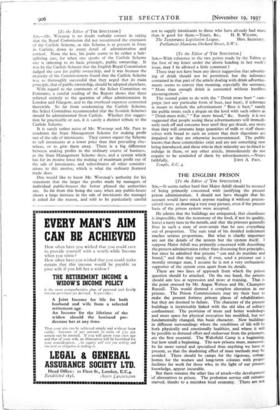[To the Editor of THE SPECTATOR.] SIR, — Mr . Worsnop is no
doubt verbally correct in saying that the Royal Commission did not recommend the extension of the Carlisle Scheme, as this Scheme is at present in force in Carlisle, down to every detail of administration and control. None the less, his point seems to be rather a hair- splitting one, for when one speaks of the Carlisle Scheme one is referring to its basic principle, public ownership. It was by the Carlisle Scheme that the English Royal Commission judged the case for public ownership, and it was because the majority of the Commissioners found that the Carlisle Scheme was so thoroughly successful that they urged that its main principle, that of public ownership, should be adopted elsewhere.
With regard to the comments of the Select Committee on Estimates, a careful reading of the Report shows that these referred entirely to the question. of office administration in London and Glasgow, and to the overhead expenses connected therewith. So far from condemning the Carlisle Scheme, the Select Committee recommended that the Scottish Schemes should be administrated from Carlisle. Whether this sugges- tion be practicable or not, it is surely a distinct tribute to the Carlisle Scheme.
It is surely rather naive of Mr. Worsnop and Mr. Pace to condemn the State Management Scheme for making profit out of the sale of intoxicants. They cannot expect the Scheme to sell intoxicants at a lower price than that prevailing else- where, or to give them away. There is a big difference between making profits in the ordinary course of business, as the State Management Scheme does, and a system which has for its motive force the making of maximum profit out of the sale of intoxicants, and subordinates all other consider- ations to this motive, which is what the ordinary licensed trade does.
One would like to know Mr. Worsnop's authority for his statement that the larger the profits made by managers of individual public-houses the better pleased the authorities are. So far from this being the case, when any public-house shows a large increase in the sale of intoxicants the manager is asked for the reason, and told to be particularly careful not to supply intoxicants to those who have already had more than is good for them.—Yours, &c., H. B. WiLsobi,
The Temperance Legislation League, Hon. Secretary. Parliament' -Mansions, Orchard Street, S.W.r.
















































































































 Previous page
Previous page